Engaging Culture Series Collection (14 vols.)
Digital Logos Edition
Overview
The Engaging and Exegeting Culture Series provides 14 volumes addressing ways to theologically interpret contemporary culture. Presenting methodological and foundational studies, the collection brings theological and spiritual reflections to cultural disciplines and expressions, including film, visual art, pop culture, leadership, theatre, and the environment. It challenges readers to seek God’s presence in contemporary culture and to engage culture with a biblical worldview.

- Analyzes aspects of contemporary culture, including film, art, music, and more
- Links theology to contemporary culture
- Provides tools to responsibly engage and interpret culture
- Title: Engaging and Exegeting Culture Series
- Publisher: Baker Academic
- Volumes: 14
- Pages: 3,838
- Everyday Theology: How to Read Cultural Texts and Interpret Trends edited by Kevin J. Vanhoozer, Charles A. Anderson, and Michael J. Sleasman
- Reframing Theology and Film: New Focus for an Emerging Discipline edited by Robert K. Johnston
- Into the Dark: Seeing the Sacred in the Top Films of the 21st Century by Craig Detweiler
- God in the Gallery: A Christian Embrace of Modern Art by Daniel A. Siedell
- The Space Between: A Christian Engagement with the Built Environment by Eric O. Jacobsen
- Visual Faith: Art, Theology, and Worship in Dialogue by William A. Dyrness
- A Matrix of Meanings: Finding God in Pop Culture by Craig Detweiler and Barry Taylor
- Reviewing Leadership: A Christian Evaluation of Current Approaches by Robert Banks and Bernice M. Ledbetter
- Reel Spirituality: Theology and Film in Dialogue, 2nd ed., by Robert K. Johnston
- Performing the Sacred: Theology and Theatre in Dialogue by Todd E. Johnson and Dale Savidge
- For the Beauty of the Earth: A Christian Vision for Creation Care, 2nd ed., by Steven Bouma-Prediger
- Hip-Hop Redemption: Finding God in the Rhythm and the Rhyme by Ralph Basui Watkins
- Personal Jesus: How Popular Music Shapes Our Souls by Clive Marsh and Vaughan S. Roberts
- Resounding Truth: Christian Wisdom in the World of Music by Jeremy S. Begbie
This title is included in the following collections
You can save when you purchase this product as part of a collection.
Baker Ultimate Collection 2022...
$38,273.89$30,599.99
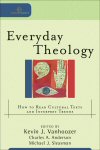
Generally speaking, students, theologians, pastors, and church leaders are well-trained in the task of biblical exegesis. Where many fall short, however, is in the area of cultural exegesis—reading and interpreting the texts and trends produced by our culture, which can have a profound influence on the way we understand the world and practice our faith. Anyone interested in the intersection of Christianity and culture needs to be able to do “everyday theology,” that is, to think theologically about our cultural environment and pass it through the grid of Scripture, in order to respond faithfully as Christian disciples.
Everyday Theology is the first volume in the Cultural Exegesis series. With an emphasis on both methodology and case study, it is well-suited for seminary classroom use. A significant introduction by Kevin J. Vanhoozer lays out the hermeneutical method for engaging with culture. This is followed by a series of essays that engage cultural texts and trends, from the music of Eminem to the grocery store checkout lane to the phenomenon of internet blogs. A concluding chapter walks the reader step-by-step through the interpretation process with an additional case study.
Contributors:
- Kevin J. Vanhoozer
- Michael J. Sleasman
- Charles A. Anderson
- Jeremy D. Lawson
- Darren Sarisky
- David G. Thompson
- Premkumar D. Williams
- Justin A. Bailey
- Matthew Eppinette
- Ben Peays
There is now a proliferation of books on religion and popular culture but very few books on theology and popular culture. This book seeks to remedy that and offers a rationale for why and how Christians should ‘read’ popular culture. Kevin Vanhoozer’s approach strikes a wise balance between interpreting popular culture with open good will for where God might really be speaking and a biblically formed suspicion for the cunning manufacture of idols. The selection of cultural artifacts examined in part two is wide ranging, quirky, and inspired.
—Kelton Cobb, professor, The Oregon Extension
I am one of those Christians who have theological questions about Eminem, MySpace, grocery stores, and the like. So I am very pleased that we now have this book of stimulating and important reflections on such matters. These authors demonstrate how to think theologically about popular culture.
—Richard J. Mouw, president and professor of Christian philosophy, Fuller Theological Seminary
This will be a useful book for church leaders in understanding the changing culture in which we live and learning to engage that culture with a biblical worldview.
—PreachingNow
Vanhoozer calls us all to become theological interpreters of everyday culture, becoming everyday theologians. . . . The subsequent chapters, which are examples of how one does everyday theology, go a long way in demonstrating how this all works. They are accessible and interesting, even clever in choice of object for analysis. . . . The book is a worthy addition to Baker Academic’s series on cultural exegesis.
—Homiletic
From the prolific pen of Kevin Vanhoozer . . . comes yet another very worthwhile publication that should be welcomed by scholar and thoughtful layman alike. . . . The examples selected exhibit a remarkable and sometimes surprising diversity of facets of our contemporary culture. . . . This book is a valuable resource for anyone seeking to gain the skills in reading and interpreting culture. Almost as a windfall, it also provides valuable insights into particular texts and trends. As one who is already a fan of Vanhoozer’s works, this book further confirms him to me as a voice to which every theologian of contemporary culture must attend.
—Cultural Encounters
Kevin J. Vanhoozer is a research professor of systematic theology at Trinity Evangelical Divinity School. He is the author or editor of many books, including the award-winning Dictionary for Theological Interpretation of the Bible.
Charles A. Anderson is a PhD candidate at the University of Cambridge.
Michael J. Sleasman is the managing director and research scholar for The Center for Bioethics and Human Dignity at Trinity International University.
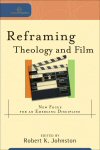
The study of theology and film has been in existence for fewer than three decades. What, then, does the future hold for this evolving subject? Robert Johnston has drawn together more than a dozen scholars who regularly write and teach on the topic in Reframing Theology and Film: New Focus for an Emerging Discipline; their contributions explore how the discipline of theology and film can flourish and mature. The book also emphasizes the overlooked and undervalued aspects of theology and film. Borne out of a three-year consultation and funded by the Luce Foundation, this project is divided into six parts. Each section concentrates on a particular theme, such as broadening the scope of films to study and engaging the perspective of film viewers and their meaning-making process.
This anthology will resonate with theology and film professors, students, pastors, librarians, and interested lay readers. Reframing Theology and Film is destined to become an important work in the expanding field of theology and film.
Contributors:
- Craig Detweiler
- Barry Taylor
- Gaye Williams Ortiz
- Sara Anson Vaux
- Gordon Lynch
- Terry Lindvall
- Clive Marsh
- Rebecca Ver Straten-McSparran
- Catherine M. Barsotti
- John Lyden
- Mitch Avila
- Christopher Deacy
- Rose Pacatte
- Gerard Loughlin
- Robert K. Johnston
Here is a fine collection of essays full of rich detail, engaging insights, and provocative suggestions. The impressive cast of authors points beyond many of the usual frames of study, offering original perspectives and new approaches. Without exception, the chapters make a valuable contribution to ongoing dynamic conversations. This is a ‘must-read’ for anyone with an interest in film and theology.
—Jolyon Mitchell, professor of communications, arts, and religion, The University of Edinburgh
In this single volume, the field of theology and film has matured from infancy to adulthood. Robert Johnston has assembled a top-notch group of scholars to set the stage for emerging directions in the field. No future writing on the topic can ignore the categories reframed by the contributors here.
—S. Brent Plate, visiting associate professor of religious studies, Hamilton College
This book is a helpful resource for connecting film and theology. It is not a beginner’s guide but a collection of academic essays from a wide variety of experts.
—Christianity
This is an important and timely work that should make an important contribution to the discipline. It deserves to be read and debated widely by scholars in the field.
—Theological Book Review
A helpful resource for connecting film and theology. . . . This is indeed an intelligent read with some world-class contributors. . . . This is an excellent book if you wish to dig deeper into the phenomenon of faith and film.
—Insights
Robert K. Johnston is a professor of theology and culture at Fuller Theological Seminary. He is the coeditor of both the Engaging Culture and the Cultural Exegesis series, and is the author or coauthor of several books, including Useless Beauty, Finding God in the Movies, and Reel Spirituality.
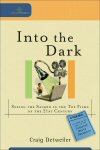
In Into the Dark, Craig Detweiler, a well-respected film expert and media spokesperson on Hollywood and Christianity, examines 45 twenty-first century films that resonate theologically—from The Lord of the Rings trilogy to Little Miss Sunshine—offering groundbreaking insight into their scriptural connections and theological applications.
Detweiler uses IMDb, the wildly popular Internet Movie Database, to select today’s most influential contemporary films. Into the Dark dissects the theology of everyday life, exploring the work of the Spirit of God in creation and redemption to discuss “general revelation” through cinema and sometimes unlikely filmmakers.
“Memory, community, and imagination offer a strong starting place for theological reflection,” Detweiler writes. Driven by the art of the films, Into the Dark opens up lively discussion topics, including anthropology, the problem of evil, sin, interconnectivity, postmodern relationships, ethics, fantasy, and communities in crisis. Notable movies discussed include Gladiator, United 93, Million Dollar Baby, and Walk the Line.
This book is recommended for college and seminary students in film, theology, and communications courses as well as pastors, film fans, and those interested in Christianity and the cinema.
Craig Detweiler’s Into the Dark is a passionate, thoughtful assessment of the spiritual aspects of cinema. Detweiler provides a refreshingly open-minded engagement with Hollywood, insisting on an integrative approach to general revelation wherein the cinematic ‘good, true, and beautiful’ are broadly defined and broadly discovered. It is uncommon to hear Christians speak of mass entertainment as ‘a form of Mass, a common grace,’ as Detweiler does, but such a perspective is sorely needed and appropriately provocative.
—Brett McCracken, film critic, Christianity Today and Relevant
I was humbled and inspired by Craig Detweiler’s encyclopedic work. As a Christian screenwriter in postmodern Hollywood, I struggle every day to find the intersection between my faith and my craft. Into the Dark illuminates many such points of cohesion but in places one wouldn’t think—or even dare—to look. Detweiler could have easily restricted his analysis to softer cinema: the anemic family dramas or self-important epics that try to pass as spiritual fare. Instead he chose to find wisdom in film’s most profound shadows. As a result, Into the Dark does more than inform; it invites us to open our eyes and discover the divine in even the most brutal of movies.
—Matt Greenberg, screenwriter and producer
Detweiler delivers one of the more successful and substantial theological interpretations of contemporary movies, mining film for spiritual meaning. . . . [He] brings his theological expertise to bear on such recent works as The Lord of the Rings trilogy, Million Dollar Baby, and Eternal Sunshine of the Spotless Mind. Besides their impressive entertainment value, these films and several others are rich in God language and religious significance. Why, some may wonder, do we need to reflect upon films so intensely? The answer is that we don’t, but if we are grasping for meaning in our culture, as Detweiler contends, movies are a fine place to start looking for God.
—Publishers Weekly
Craig Detweiler is an associate professor of communication at Pepperdine University in Malibu, California. He previously served as codirector of the Reel Spirituality Institute at Fuller Theological Seminary. Detweiler has written scripts for numerous Hollywood films, and his social documentary, Purple State of Mind, debuted in 2008. He has been featured in the New York Times, on CNN, and on NPR and is the coauthor of A Matrix of Meanings.
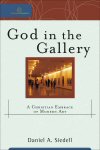
Unfortunately, within certain Christian communities, art is often viewed with skepticism, if not disdain. Art historian, critic, and curator Daniel Siedell presents a different perspective in God in the Gallery: A Christian Embrace of Modern Art. It is a welcome addition to the scant volumes that cover an evangelical reflection on the arts and the aesthetic life. Siedell ultimately contends that art is not antithetical or hostile to Christianity. Instead, it’s in dialogue with it as well as a gift as opposed to a threat to faith. The author extracts insights about worldviews from thinkers ranging from Francis Schaeffer to David Naugle. Furthermore, he constructs a framework for interpreting modern art “in Christ.” Siedell also examines the role of visual art in worship and Christian experience. The book is enhanced with images from such artists as Andy Warhol, Jackson Pollock, Enrique Martinez Celaya, and others.
God in the Gallery will serve as an essential text for Christian colleges that emphasize worldview thinking and integration of faith and learning; in addition, it will play a helpful role in curriculum development and will reshape the direction of campus art departments and galleries. In sum, professors and students of art, aesthetics, theology, and the intersection of faith and culture will appreciate this dialogue.
We’ve been waiting for this book for nearly 40 years. Finally, a robust and unapologetically Christian engagement with contemporary art by an ‘insider’ to its world and conversation. Though Siedell invites us beyond the wooden ideal of ‘the Christian artist,’ at the same time he articulates a vision of artistic practice and criticism rooted in the church. He provides much-needed wisdom, modeling how Christians can charitably engage modern art. He also provides much-needed guidance for how Protestants can—and should—incorporate the arts in worship beyond the eclectic pastiche of the ‘hip.’ Required reading for emerging artists—and their teachers.
—James K. A. Smith, professor of philosophy, Calvin College
God in the Gallery is a seminal work of interpretation, a guide for skeptics and faithful alike, in which Siedell offers a most profound, encouraging survey of contemporary art. An Emmaus Road encounter for those traveling on the path of contemporary art, Siedell’s careful and loving attention paid to known and unknown artists will surely open our eyes. A must read for all of us laboring in the art world and in the arts academia.
—Makoto Fujimura, artist, founder/creative director, International Arts Movement
Dan Siedell is an exceptionally thoughtful and articulate observer of the very difficult intersection of religious belief and contemporary art. Writing from the perspective of a committed religious belief, Siedell makes his careful way toward modernism and postmodernism, paying attention to those moments when modernism’s utopian aims have appeared as the search for ‘a new world, a better world, a perfect world, redeemed, perhaps saved.’ Siedell argues, very gently, for a more capacious reading of secularist critics, such as Clement Greenberg, and he reads Janine Antoni, Wolfgang Laib, and even Jackson Pollock as instances of ‘artistic practices of belief.’ The aim is to develop a ‘rich vocabulary’ to help revive ‘the sacramental and liturgical identity of human practice.’ The book is full of unexpected and promising confluences. Here a reader will find the principal secular theorists of modernism, but this book is also ‘nourished by Nicene Christianity’ and informed by a wonderful range of authors, from Florensky, Levinas, and Wyschogrod to Seerveld, Wolterstorff, Walford, and Dyrness. This is a tremendous book, a genuine effort at dialogue in an arena marked by the near-complete absence of open exchange.
—James Elkins, E. C. Chadbourne Chair in the Department of Art History, Theory, and Criticism, School of the Art Institute of Chicago
Daniel A. Siedell is the director of theological and cultural practices at Coral Ridge Presbyterian Church in Fort Lauderdale, Florida, and chancellor at Knox Seminary. He previously served as professor of modern and contemporary art history at the University of Nebraska at Omaha and was curator of the Sheldon Memorial Art Gallery at the University of Nebraska-Lincoln. He has published numerous articles in Books & Culture, Christian Scholar’s Review, Studies in Religious Perspectives, and various other journals.
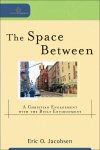
The entire material world can be divided between the natural environment and the built environment. Over the past 40 years, the natural environment has received the greater share of attention of the two, but that is beginning to change. With a renewed interest in “place” within various academic disciplines and the practical issues of rising fuel costs and scarcity of land, the built environment has emerged as a coherent and engaging subject for academic and popular consideration.
While there is a growing body of work on the built environment, very little of it approaches the built environment from a distinctly Christian perspective. This major new work by Eric Jacobsen, author of the well-received Sidewalks in the Kingdom, represents a comprehensive and grounded approach. Jacobsen develops a framework for understanding the built environment and addresses timely and controversial topics such as gentrification, urban sprawl, and energy consumption. Employing tools from the field of theology and culture, he demonstrates how looking at the built environment through a theological lens provides a unique perspective on questions of beauty, justice, and human flourishing.
The Space Between is embellished with plentiful photographs, illustrations, charts, and exercises and will be of interest to students in cultural hermeneutics, theology and culture, urban ministry, or new urbanism/built environment courses at the college and seminary level. Pastors, missionaries, church planters, and Christian professionals will also find it of interest.
In The Space Between, Eric O. Jacobsen sets himself two goals: to get us to attend to urban space—the space between the buildings in a city or village—and to explain why Christians in particular should care about the quality of urban space. He succeeds admirably on both counts; cities will look different to you once you have read this book. Along the way he also introduces us to some of the most recent writings on urban space, and he offers a compelling explanation of why the urban space of our present-day American cities came to be as it is and why we should be dissatisfied with it. It’s a fine contribution to an extremely important topic that has been neglected for too long by too many.
—Nicholas Wolterstorff, Noah Porter Emeritus Professor of Philosophical Theology, Yale University
Jacobsen’s book awakens us from our Gnostic slumbers. It reminds us that as embodied beings, we not only move through space but inhabit particular places. And it asks us how we ought to make and dwell in the built environment to the glory of God. The Space Between takes us on an eye-opening tour of the places that both shape and reflect us. Readers may never look at their homes, neighborhoods, towns, and churches in the same way again. This is an important first step in reclaiming the locality of the local church.
—Kevin J. Vanhoozer, research professor of systematic theology, Trinity Evangelical Divinity School
Jesus urges us to love our neighbor, but in many modern cities we have destroyed our neighborhoods, making it much more difficult to know who our neighbors are let alone love them. In this compelling and beautifully written book Eric Jacobsen tells us how that has happened, why it matters, and what we should be doing about it. This book calls us to think again, and more theologically, about the way our built environment shapes our life together. It invites us to consider how, through the shaping of our neighborhoods, we may participate more faithfully in the coming kingdom of God.
—Murray Rae, head of the department of theology, University of Otago
Eric O. Jacobsen is senior pastor of First Presbyterian Church in Tacoma, Washington. He is the author of Sidewalks in the Kingdom: New Urbanism and the Christian Faith and numerous articles exploring connections between the Christian community, the church, and traditional neighborhoods. He is also the coeditor of Traditions in Leadership and The Three Tasks of Leadership.
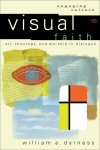
How can art enhance and enrich the Christian faith? What is the basis for a relationship between the church and visual imagery? Can the art world and the Protestant church be reconciled? Is art idolatry and vanity, or can it be used to strengthen the church? Grounded in historical and biblical research, William Dyrness offers students and scholars an intriguing, substantive look into the relationship between the church and the world of art.
Faith and art were not always discordant. According to Dyrness, Israel understood imagery and beauty as reflections of God’s perfect order; likewise, early Christians used art to teach and inspire. However, the Protestant church abandoned visual arts and imagery during the Reformation in favor of the written word and has only recently begun to reexamine art’s role in Christianity and worship. Dyrness affirms this renewal and argues that art, if reflecting the order and wholeness of the world God created, can and should play an important role in modern Christianity.
Please note that this volume will not include images.
Both theological and practical, this wide-ranging study will be of special interest to all who want to get beyond the sterile prejudices that have so often marred the relation between visual art and Protestantism.
—Jeremy Begbie, Thomas A. Langford Research Professor of Theology
Dyrness advocates ‘careful historical and theological reflection’ and puts this into practice in ways that satisfy the academic mind. Most of all, however, he emerges as a theologian of the arts with a message for the churches. He offers a well-founded critique of traditional Protestant prejudice against matters visual and artistic, and he issues an inspiring challenge to follow the Spirit into richer modes of praise and worship.
—Graham Birtwistle, associate professor, The University of Sheffield
A refreshing and welcome addition to the growing discourse on a Protestant recovery of visual imagination and the need for Christians of all stripes to engage and exploit the visual arts—both in the secular marketplace and within the worshiping life of the church.
—E. John Walford, professor of art history, Wheaton College
The image-oriented insularity found in certain sectors of the Protestant church is sensitively and thoughtfully challenged by Bill Dyrness in this insightful guide. Visual Faith weaves together a compelling case for the collaboration between art and Christianity. Placing the complex world of contemporary art making within historical, theological, and cultural contexts, Dyrness affirms the necessity of images in the ongoing vitality of the church and her mission.
—Barry Krammes, professor of art, Biola University
William A. Dyrness is a professor of theology and culture at Fuller Theological Seminary. He is the author of many books, including The Earth Is God’s: A Theology of American Culture.
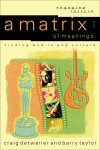
From the glittering tinsel of Hollywood to the advertising slogan you can’t get out of your head, we are surrounded by popular culture. In contrast to some traditional Christian responses, which have been to shun aspects of popular culture, Craig Detweiler and Barry Taylor offer an insightful treatise on its value in A Matrix of Meanings: Finding God in Pop Culture.
Rather than offering a theology for pop culture, as some recent commentators have, the authors create a constructive theology out of pop culture. Instead of passing judgment on popular culture the authors analyze its elements and ask “What are they doing? What do they represent?” and “What do they say about the world in which we live?” Rather than deciding whether Bono, Britney, and the cast of Friends deserve our admiration, Detweiler and Taylor ask what the phenomena of celebrity idolization means. They do not examine whether Nike’s “just do it” campaign is morally questionable; instead, they ask what its success says about our society.
A Matrix of Meanings can be read in at least three ways: as a study of the marketplace driven by consumerism and fueled by advertising, whose highest aspirations are attained in celebrity; as a study of isolated artistic forms—music, movies, television, fashion, sports, art—and what they may tell us about our world, ourselves, and our God; and as a broad survey of our culture that reveals trends that cross art forms. These cultural shifts, studied in the marketplace and manifested across pop cultural forms, create a lived theology that reveals the very nature of Christ and his kingdom.
Most of us look to pop culture to comment on how bad it is and how countercultural we need to be. A Matrix of Meanings takes us a few levels deeper to find a surprising and provocative search for spiritual meaning in places we would never expect. This book helps us get connected.
—Robert Webber (1933–2007), Emeritus Myers Professor of Ministry, Northern Seminary
Popular culture has become the environment in which we live, move, and have our being. The authors of this analysis and evaluation have the advantage of being professional practitioners—one in music, one in filmmaking—as well as acute observers of popular culture. One does not have to agree with all their judgments or responses to commend this book as the most insightful and stimulating recent Christian study of the subject.
—Robert Banks, professor, Macquarie Christian Studies Institute, Sydney, AU
If you need a book that’ll help you navigate the always changing and highly influential world of pop culture, this book is a must have. Tackling subjects like movies, television, fashion, advertising, sports, and art, the authors make sense of where culture has been, where it’s heading, and what the trends and changes mean for the ministry. The book is witty, factual, and easy to read. Definitely worth buying and digesting.
—Youthworker
Craig Detweiler is an associate professor of communication at Pepperdine University in Malibu, California. He previously served as codirector of the Reel Spirituality Institute at Fuller Theological Seminary. Detweiler has written scripts for numerous Hollywood films, and his social documentary, Purple State of Mind, debuted in 2008. He has been featured in the New York Times, on CNN, and on NPR.
Barry Taylor is an artist in residence and adjunct professor at the Brehm Center for Worship, Theology, and the Arts. He has coauthored two books, including A Heretic’s Guide to Eternity.
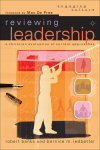
In Reviewing Leadership, Robert Banks and Bernice M. Ledbetter offer an acute theological analysis of the influence and importance of leadership in our culture today. The authors begin by analyzing the current growing interest in leadership and examining its development within the church. Next, they consider the spiritual dimensions of leadership. Finally, they offer examples of exceptional Christian leadership and discuss ways to nurture this type of leadership for the future.
It’s not easy to lead Christianly, but for those who want to examine the best thinking on what it means to be a servant-leader, Banks and Ledbetter have compiled a broad and helpful survey of the recent literature.
—Marshall Shelley, vice president, Christianity Today
This book is a wellspring of knowledge about the intersection of leadership and Christian worldviews. Its ecumenical breadth and analytical depth can guide Christians from many traditions in shaping leadership for both the church and society. This resource should be embraced by all who care deeply about the theory and practice of Christian leadership.
—Shirley J. Roels, director, Lilly Vocation Project, Calvin College
Every wise leader I know learns from the past and applies it to the future. Books on leadership abound, yet anyone who begins a serious study into this subject needs to become familiar with the broad history of leadership development, both its theory and practice. Wouldn’t it be wonderful if one book contained some of the most insightful writings and thoughts from past to present? Reviewing Leadership is such a book and should be on every Christian leader’s bookshelf.
—Carson Pue, executive director, First Baptist Church, Vancouver, BC
This book is more than a dry bibliography of the literature on leadership. Banks and Ledbetter have crafted a theological and spiritual reflection on leadership for service in the world that is both timely and timeless. This is an indispensable guide for those who teach and nurture leaders.
—R. Paul Stevens, Emeritus David J. Brown Family Professor of Marketplace Theology and Leadership, Regent College
The best word to summarize this book is ‘comprehensive.’. . . A valuable resource. Properly studied, this book will allow novices in the area of leadership to discuss the topic intelligently and thus would benefit any reader.
—Southwestern Journal of Theology
Robert Banks is a professor at Macquarie Christian Studies Institute in Sydney, Australia. Previously he was the founding professor of the ministry of the laity at Fuller Theological Seminary in Pasadena, California, and executive director of the De Pree Leadership Center.
Bernice M. Ledbetter is the practitioner faculty in Organizational Theory and Management at Pepperdine University. She is the former director of the De Pree Leadership Center at Fuller Theological Seminary.
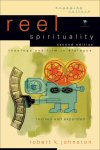
Reel Spirituality traces the powerful role that movies play in our cultural dialogue and guides Christian moviegoers into a theological analysis of and conversation with film. It successfully heightens readers’ sensitivity to the theological truths and statements about the human condition expressed through modern cinema.
This new edition of a bestselling textbook has been substantially rewritten, mentions 200 additional movies, and offers in-depth discussion of eight recent popular films, including March of the Penguins, Magnolia, and Million Dollar Baby. It encourages readers to ponder movie themes that permeate our culture as well as motion pictures that have demonstrated power to shape our perceptions of everything from relationships and careers to good and evil. In addition, the second edition adds two new chapters—one on the role of music and image for understanding a film’s power and meaning and one that helps viewers wrestle with ethical issues raised in film-viewing experiences. Beyond exploring “why” Christians should be involved with film, the second edition now offers a sustained discussion of “how” they might best do this.
Considering the thousands of films shown every year, and the vast crowds who rush to see them, it is remarkable that so little sustained Christian attention has been paid to the world of the ‘big screen.’ Films can undoubtedly shape and change our fundamental attitudes and beliefs. Here, at last, is an attempt to take that with theological seriousness. Reel Spirituality will not only help us develop a Christian wisdom about film; in turn, it will also make us ask searching questions about the Christian faith and the way we express it. Throughout, the book is accessible and engaging. I commend it most warmly.
—Jeremy Begbie, Thomas A. Langford Research Professor of Theology, Duke Divinity School
In opening the windows of his seminary classes, Robert Johnston has quickened and refreshed the conversations between theology and the culture of film. He weaves the stories of the two worlds, church sanctuaries and cinema theaters, into a lively and provocative dialogue that bridges the worlds of Christian truth and visual images. Neither abandoning the flickering shadows of culture nor embracing their seductive illusions, Johnston is first and foremost a storyteller who guides his readers in seeing and understanding film from spiritual perspectives. Walking through the world of films with him offers a glorious unveiling of how the unreal world of film reveals real questions of theology. He is a fascinating host who invites willing pilgrims to hike with him toward the relevance of the Gospel in a fallen culture, and to enjoy the cinematic signs along the way.
—Terry Lindvall, C. S. Lewis Professor of Communication and Christian Thought, Virginia Wesleyan College
Johnston’s book provides numerous examples of how dialogue between film and theology can take place. These examples help lead readers toward dialogical reflection of their own. This second edition of Reel Spirituality expands on the ideas of the previous one and includes discussion of films that have appeared in the past six years. Reel Spirituality is particularly helpful in showing how films can be respected as artistic representations and also considered in a specifically theological context. . . . Recommended. Lower/upper-level undergraduates, graduate students, and general readers.
—Choice
Robert K. Johnston is a professor of theology and culture at Fuller Theological Seminary. He is the coeditor of both the Engaging Culture and the Cultural Exegesis series, and is the author or coauthor of several books, including Useless Beauty and Finding God in the Movies.
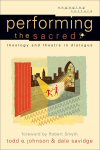
Performing the Sacred is the first book-length exploration of the intersection of theatre and theology, illuminating the importance of preserving live performance in a virtual world. This compelling dialogue unfolds between a theologian and a theatre artist who revisit theatre’s rich history and paint a picture of its promising future while building bridges between theatre and Christianity.
Theologically, theatre reflects Christianity’s central doctrines—incarnation, community, and presence—enhancing the human experience and shedding new light on theology. The authors show how theatre engages viewers on multiple levels, including political, social, religious, personal, intellectual, emotional, and kinesthetic. In theatre, the presence of live human beings speaks of the incarnate nature of God’s redemption in Christ and the imago Dei. The communal nature of theatre models the Trinity, while the immediacy and transcendence of theatre performance draw out the presence of God in nature and grace.
Performing the Sacred encourages Christians to celebrate, embrace, and experiment with dramatic stories found in Scripture. This title will be key for teaching theatre in the academy and influencing drama practitioners, worship leaders, and culture makers.
Performance theory, history, criticism, theology, and worship are all brought together in a refreshing new look at the old art of live theatre in Performing the Sacred. It is not only an entertaining read by itself but also a unique and much-needed text for university theatre arts courses.
—Gillette Elvgren, professor, Department of Cinema-Television, Regent University
Reading Performing the Sacred is akin to the thrill of the theatre’s house lights dimming, the stage lights intensifying, and a great play beginning. The panoramic sweep of more than twenty centuries of theatre and theology—beginning with the ancient Greeks, detailing the mystery plays of the medieval period, and examining present-day drama—is a tour de force. Through it all, the authors articulate and affirm the indispensable role the audience plays in the production of good drama. Christian playgoers, after reading this book, will come to understand and appreciate even more deeply the theological dynamics of incarnation, Trinity, and presence at the heart of theatre. Performing the Sacred deserves a standing ovation!
—Peter Gilmour, emeritus professor, Institute of Pastoral Studies, Loyola University Chicago
We have been waiting years and years for theatre artists and Christian theologians to get back into serious dialogue, and there is hardly anyone better prepared to lead us than Todd Johnson and Dale Savidge. This book is a hugely significant conversation starter. Decades from now we will be saying that the conversation began with this book.
—Jeff Barker, professor of theatre and speech, Northwestern College
A compelling conversation between a theologian and a theater professional, Performing the Sacred provides a helpful overview of the history of theatre and summarizes much of the writing about theatre and the church, but it is groundbreaking when it begins to explore the relationship between the embodiment of story in theatrical rehearsal and performance and the embodiment of our theology in worship and practice.
—Comment
Todd E. Johnson is the William K. and Delores S. Brehm Associate Professor of Worship, Theology, and the Arts at Fuller Theological Seminary. He is an ordained minister in the Evangelical Covenant Church and the editor of The Conviction of Things Not Seen.
Dale Savidge is the executive director and founding member of Christians in Theatre Arts (CITA). He is chair of the theatre arts department at North Greenville University and has traveled the world as a theatre artist.
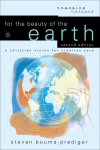
There is an ever-increasing interest among Christians in caring for the environment. In the second edition of his highly acclaimed book, Steven Bouma-Prediger provides the most thorough evangelical treatment available on a theology of creation care. Arguing that authentic Christian faith requires ecological obedience, he urges Christians to acknowledge their responsibility and privilege as stewards of the earth. This edition has been substantially revised and updated with the latest scientific and environmental research.
The goal of this book is simply stated: to inform and persuade. Behind the information and persuasion, however, is a complex call to ecological responsibility. . . . The final chapters present a convincing argument for Christians to engage deeply with the world they inhabit, a virtue that marks authentic faith. Taking this text seriously is bound to infuse our corporate worship practices and our individual lifestyles. Moreover, it is bound to hold all Christians accountable for actively joining the dialogue between ecology and theology.
—Worship Leader
For the Beauty of the Earth [is the] second edition of a well-respected work from 2001, when creation care was not to any great extent on the evangelical radar. . . . Bouma-Prediger brings together well-researched biblical study and solid ecological, philosophical, and poetic material. . . . Accessibly and engagingly, he outlines an ecological state of the union and then surveys a biblical view of ecology. . . . He faithfully treats texts in light of the larger biblical narrative and the cultures in which they were written.
—Christianity Today
[This book] is obviously the fruit of excellent classroom experience and solid scholarship. . . . [Bouma-Prediger] writes from a reformed Christian perspective that is engaging and persuasive to readers across the ecumenical spectrum. . . . In an Introduction and eight chapters that are organized logically and flow well from one to the next, Bouma-Prediger convincingly demonstrates that [ecology] has everything to do with [theology]. . . . For the Beauty of the Earth is perfectly suited for college level courses and does not require an extensive background in environmental science or ethics to understand its message. The book models for students how theology can engage a variety of other disciplines in a coherent and integrated fashion in order to address what may be the most important problem facing us for the foreseeable future. Indeed, it is one of those rare books that students say they find hard to put down.
—Catholic Books Review
Steven Bouma-Prediger is professor of religion and chair of the religion department at Hope College. He is the author of The Greening of Theology: The Ecological Models of Rosemary Radford Ruether, Joseph Sittler, and Jurgen Moltmann and the coauthor of Assessing the Ark: A Christian Perspective on Non-human Creatures and the Endangered Species Act (with Virginia Vroblesky) and Evocations of Grace: The Writings of Joseph Sittler on Ecology, Theology, and Ethics (with Peter Bakken).
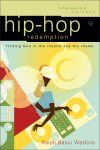
Hip-hop culture is experiencing a sea change today that has implications for evangelism, worship, and spiritual practices. Yet Christians have often failed to interpret this culture with sensitivity. Sociologist, preacher, pop-culture expert, and DJ Ralph Watkins understands that while there is room for a critique of mainstream hip-hop and culture, by listening more intently to the music’s story listeners can hear a prophet crying out, sharing the pain of a generation that feels as though it hasn’t been heard. His accessible, balanced engagement reveals what is inherently good and redeeming in hip-hop and rap music and uses that culture as a lens to open up the power of the Bible for ministry to a generation.
From Gil-Scott Herron, Ice-T, DMX, Lil’ Kim, Mos Def, and Lauryn Hill to Christology, soteriology, and the role of the church, Hip-Hop Redemption is a brilliant read! Ralph Watkins’s gifts as a socio-theologian and hip-hop devotee come together in a way that redeems an essential dialogue for engaging realities of the church and today’s urbanized and global society.
—Ronald E. Peters, president, Interdenominational Theological Center, Atlanta, GA
Hip-hop deserves the theological interpretation that Watkins provides. This book should have a wide readership.
—James H. Cone, Charles Augustus Briggs Distinguished Professor of Systematic Theology, Union Theological Seminary
Watkins takes the reader on an allegorical theological journey into the heart of hip-hop culture and challenges us to examine the culture not just from the surface—with all its seemingly blasphemous aesthetics—but from a deeper theological vantage point asking this question: Where does God show up and speak within and through hip-hop culture? This read is for anyone wanting to gain a deeper understanding of not only theology and culture but also how hip-hop’s redemptive value is shown in its style, prose, syntax, and spirituality. Watkins’s text is a valuable addition to the growing scholarship in the field of hip-hop theological study.
—Daniel White Hodge, lecturing professor of religion and culture, California State University
Ralph Basui Watkins remixes hip-hop history from the inside—as a DJ and a scholar—with deep love and respect for the music. He engages in dual listening, connecting the plaintive raps of DMX and Common with the biblical tradition. Watkins also hears women calling hip-hop to a higher standard in the music of Lauryn Hill. Hip-Hop Redemption refreshed my playlist and my spirit. Like Grandmaster Flash, Watkins delivers ‘The Message.’
—Craig Detweiler, associate professor of communication, Pepperdine University
Ralph Basui Watkins is associate professor of evangelism and church growth at Columbia Theological Seminary in Decatur, Georgia, and the author of several books, including From Jay-Z to Jesus and The Gospel Remix. He previously was an assistant dean of the African American church studies program and an associate professor of society, religion, and Africana studies at Fuller Theological Seminary.
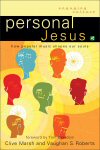
Pop music is now an ever-present force shaping citizens in the West. Even at funerals, it is often requested over hymns. But how does popular music work? And what roles does it play for listeners who engage it? This new addition to the critically acclaimed Engaging Culture series explores the theological significance of the ways pop music is listened to and used today.
Clive Marsh and Vaughan Roberts show that popular music is used by religious and nonreligious people alike to make meaning, enabling listeners to explore human concerns about embodiment, create communities, and tap into transcendence. They assess what is happening to Christian faith and theology as a result. Personal Jesus incorporates case studies featuring noted music artists of our day—including David Bowie, Michael Jackson, Sigur Rós, Pete Seeger, Bruce Springsteen, and Lady Gaga—and includes practical implications for the church, the academy, and daily musical listening. It will be of interest to professors and students of theology and culture, religious studies, and popular culture.
Personal Jesus is one of the best theological treatments of pop culture I have ever read. Marsh and Roberts offer a many-layered, comprehensive model for how we can more thoughtfully understand and engage pop music. Weaving together an impressive array of scholarship on the subject and a wide variety of music—everyone from Springsteen to Lady Gaga—Personal Jesus is a book that will help pastors, students, scholars, and everyday music fans better understand how and why pop music matters in the Christian life.
—Brett McCracken, film critic, Christianity Today and Relevant
Marsh and Roberts prepare the way for a new style of making theological sense of popular culture. The continued decline of the influence of religious traditions makes this kind of theological study even more imperative. In this situation, Marsh and Roberts show us why studying the lived experience of popular music is an imperative if we want to find out where religion cohabitates with ordinary stuff, more or less openly, today: in the spaces of meaning communicated by music in everyday life.
—Tom Beaudoin, associate professor of theology, Fordham University (from the foreword)
Clive Marsh is senior lecturer and director of learning and teaching at the Institute of Lifelong Learning, University of Leicester. He is the author of many books, including Cinema and Sentiment: Film’s Challenge to Theology and Theology Goes to the Movies: An Introduction to Critical Christian Thinking.
Vaughan S. Roberts is the rector of St. Ebbe’s Church, Oxford, United Kingdom, and an active writer on topics of religion and contemporary culture.
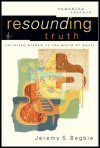
From an iPod to a car radio, from movie soundtracks to Muzak at the shopping mall, from singing in the shower to the concert arena, music is an unavoidable part of our lives. Not only is music ubiquitous, it is powerful: creating moods, evoking memories and images, uniting people, and providing an outlet of expression for even the most tone deaf among us. Besides its prominent position in culture, music has obviously had a key role in the worship of God’s people. Under Christ’s lordship, such a pervasive and universal influence deserves informed theological reflection.
In this well-rounded study, Jeremy Begbie examines the connections between music and theology by engaging Scripture, musical history, and contemporary culture. He explores how God’s truth sounds and how it might “re-sound” in the realm of music. Appropriate for classes in music, theology and the arts, and Christian cultural engagement, Resounding Truth will help the reader develop discernment and wisdom, both for thinking about music in the church and Christian life and for engaging with one of culture’s most influential touchstones.
A profound, rigorous, and original work. Very few new books in theology or religious studies show this level of freshness and imagination. I hope it will be a landmark essay in this crucial field of reflection on theology and the creative arts.
—Rowan Williams, Archbishop of Canterbury
Jeremy Begbie is musician/theologian par excellence. Whatever music you enjoy and wherever you are on the journey of faith and understanding, he will delight, surprise, challenge, and inspire you. A wonderful book by a wonderful writer, thinker, and musician.
—N. T. Wright, Bishop of Durham
Jeremy Begbie has published a number of fine books in which he, as both a Christian theologian and a practicing musician, reflects on music; but this is his finest. It is theologically acute, deeply informed by both the history of music and the history of reflections on music, and throughout displays Begbie’s wide-ranging engagement with music of many kinds from both the past and the present. A rich contribution!
—Nicholas Wolterstorff, Noah Porter Emeritus Professor of Philosophical Theology, Yale University and University of Virginia
Jeremy Begbie’s thinking emerges out of a fusion of the best musical thinking about theology and the best theological thinking about music. The resulting text is charged with energy and insight—and not just for musicians and theologians. This vital work is poised to energize and strengthen the entire Christian community.
—John D. Witvliet, professor of worship and music, Calvin Institute of Christian Worship
This book resounds with the thoughtful, dynamic, and always engaging voice of Jeremy Begbie. Marked by a breathtaking range, driven by a creative vision, and packed with judicious insights, it will no doubt shape conversations about theology and the arts for years to come.
—Roger Lundin, R. F. Holmes Professor of Faith and Learning, Wheaton College
Jeremy S. Begbie (PhD, University of Aberdeen) is Thomas A. Langford Research Professor of Theology at Duke Divinity School in Durham, North Carolina. He previously served as honorary professor of theology at the University of St. Andrews; associate principal of Ridley Hall, Cambridge; and an affiliated lecturer in the Faculty of Divinity at the University of Cambridge. A notable pianist, he has lectured widely in the UK, the US, and South Africa. He is the author of Voicing Creation’s Praise: Towards a Theology of the Arts and Theology, Music, and Time and the editor of Beholding the Glory: Incarnation through the Arts and Sounding the Depths: Theology through the Arts.